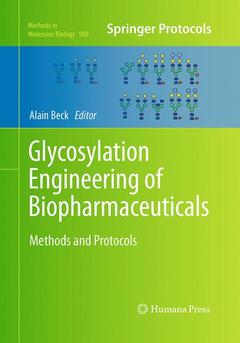Description
Glycosylation Engineering of Biopharmaceuticals, Softcover reprint of the original 1st ed. 2013
Methods and Protocols
Methods in Molecular Biology Series, Vol. 988
Language: English
Subjects for Glycosylation Engineering of Biopharmaceuticals:
Approximative price 126.59 €
Subject to availability at the publisher.
Add to cartSupport: Print on demand
355 p. · 17.8x25.4 cm · Hardback
Description
/li>Contents
/li>Comment
/li>
Glyco-engineering is being developed as a method to control the composition of carbohydrates and to enhance the pharmacological properties of monoclonal antibodies (mAbs) and other proteins. In Glycosylation Engineering of Biopharmaceuticals: Methods and Protocols, experts in the field provide readers with production and characterization protocols of glycoproteins and glyco-engineered biopharmaceuticals with a focus on mAbs. The volume is divided in four complementary parts dealing with glyco-engineering of therapeutic proteins, glycoanalytics, glycoprotein complexes characterization, and PK/PD assays for therapeutic antibodies. Written in the highly successful Methods in Molecular Biology? series format, chapters include introductions to their respective topics, lists of the necessary materials and reagents, step-by-step, readily reproducible laboratory protocols, and tips on troubleshooting and avoiding known pitfalls.
Authoritative and cutting-edge, Glycosylation Engineering of Biopharmaceuticals: Methods and Protocols serves as an ideal guide for scientists striving to push forward the exciting field of engineered biopharmaceuticals.
Engineering of Therapeutic and Diagnostic O-Glycans on Recombinant Mucin-Type Immunoglobulin Fusion Proteins Expressed in CHO Cells.- Engineering a Human-Like Glycosylation to Produce Therapeutic Glycoproteins Based on 6-Linked Sialylation in CHO Cells.- Glycoengineered Pichia-Based Expression of Monoclonal Antibodies.- N-Glycosylation Humanization for Production of Therapeutic Recombinant Glycoproteins in Saccharomyces cerevisiae.- Engineering the Baculovirus Genome to Produce Galactosylated Antibodies in Lepidopteran Cells.- Nano LC Chips MS/MS for the Characterization of N-Glycopeptides Generated from Trypsin Digestion of a Monoclonal Antibody.- Cetuximab Fab and Fc N-Glycan Fast Characterization Using IdeS Digestion and Liquid Chromatography Coupled to Electrospray Ionization Mass Spectrometry.- Therapeutic Antibody Glycosylation Analysis: A Contract Research Organization Perspective in the Frame of Batch Release or Comparability Support.- Mass Spectrometric Analysis of O-Linked Oligosaccharides from Various Recombinant Expression Systems.- Assessing Fc Glycan Heterogeneity of Therapeutic Recombinant Monoclonal Antibodies Using NP-HPLC.- Application of Capillary Electrophoresis in Glycoprotein Analysis.- Characterization of Glycoprotein Biopharmaceutical Products by Caliper LC90 CE-SDS Gel Technology.- Hydrophobic Interaction Chromatography to Analyze Glycoproteins.- Lectin Glycoprofiling of Recombinant Therapeutic Interleukin-7.- Analysis of Monoclonal Antibodies by Sedimentation Velocity Analytical Ultracentrifugation.- Noncovalent Mass Spectrometry for the Characterization of Antibody/Antigen Complexes.- Conformational Analysis of Recombinant Monoclonal Antibodies with Hydrogen/Deuterium Exchange Mass Spectrometry.- Epitope Mapping of Antibodies by Mass Spectroscopy: A Case Study.- Evaluation of Antibody-Dependent Cell Cytotoxicity Using Lactate Deshydrogenase (LDH) Measurement.- Evaluation of Complement Dependent Cytotoxicity Using ATP Measurement and C1q / C4b Binding.- Capture of the Human IgG1 Antibodies by Protein A for the Kinetic Study of h-IgG / FcgR Interaction Using SPR-Based Biosensor Technology.- Mass Spectrometry Protocol for the Absolute Quantification of a Monoclonal Antibody in Serum with Immunopurification.




